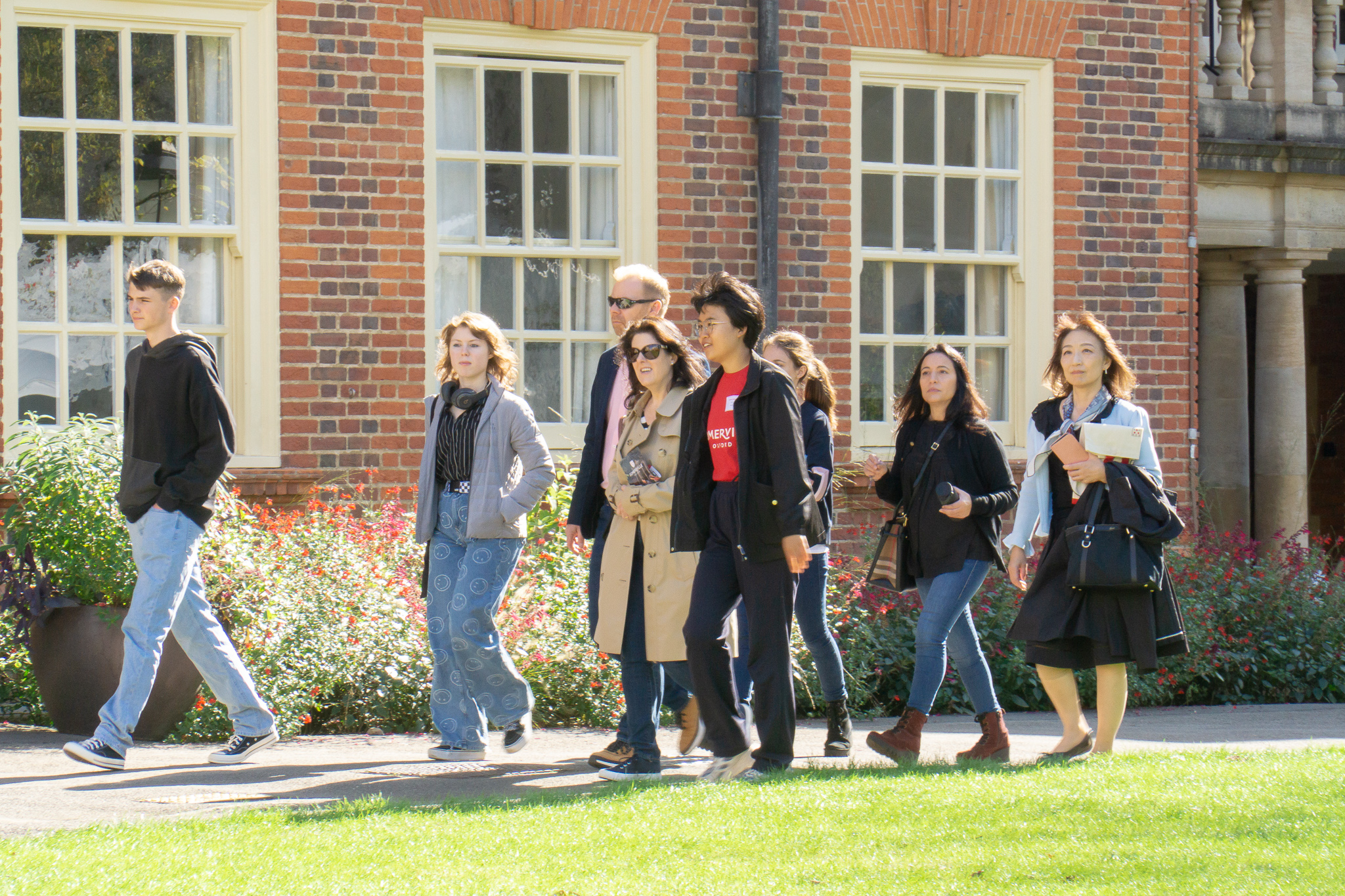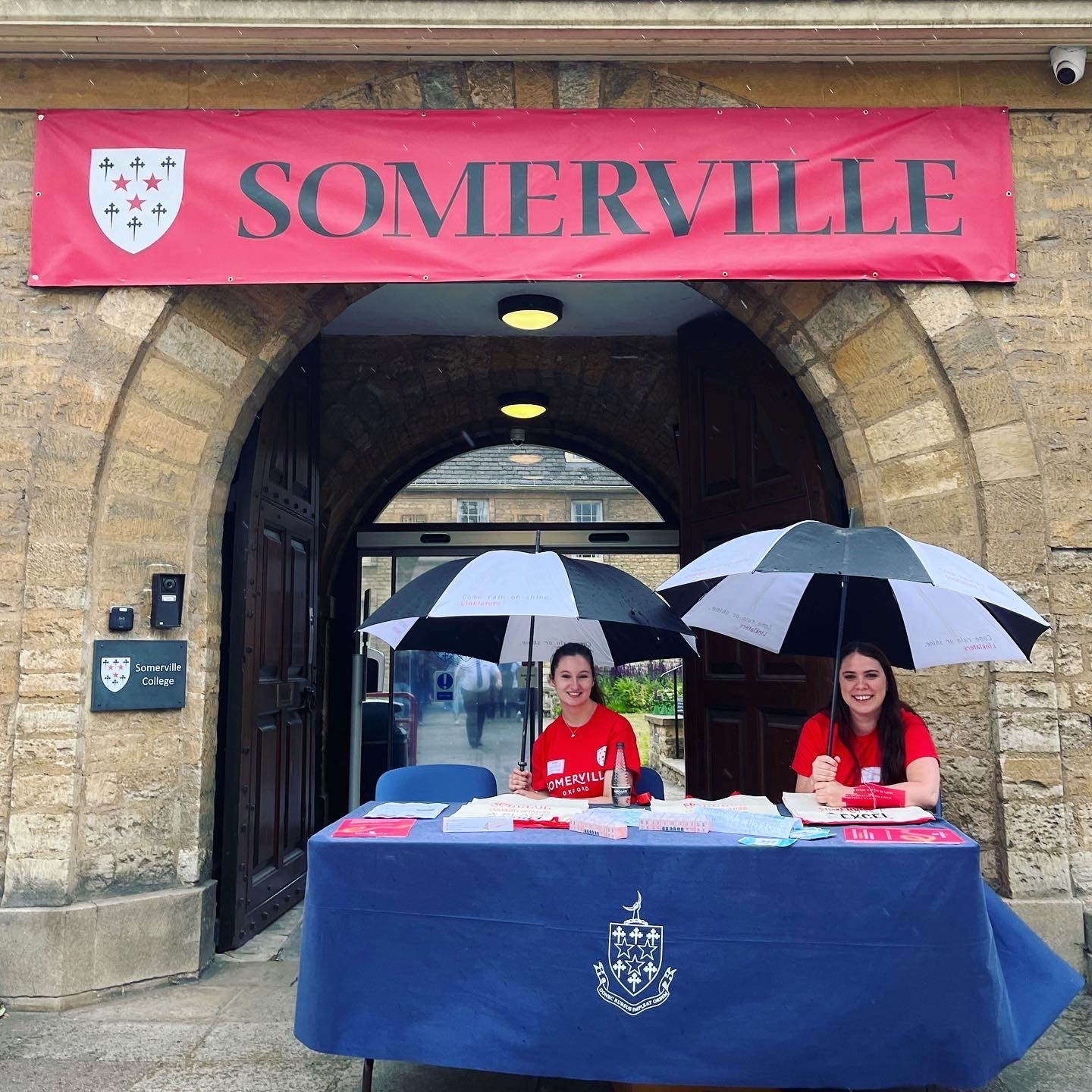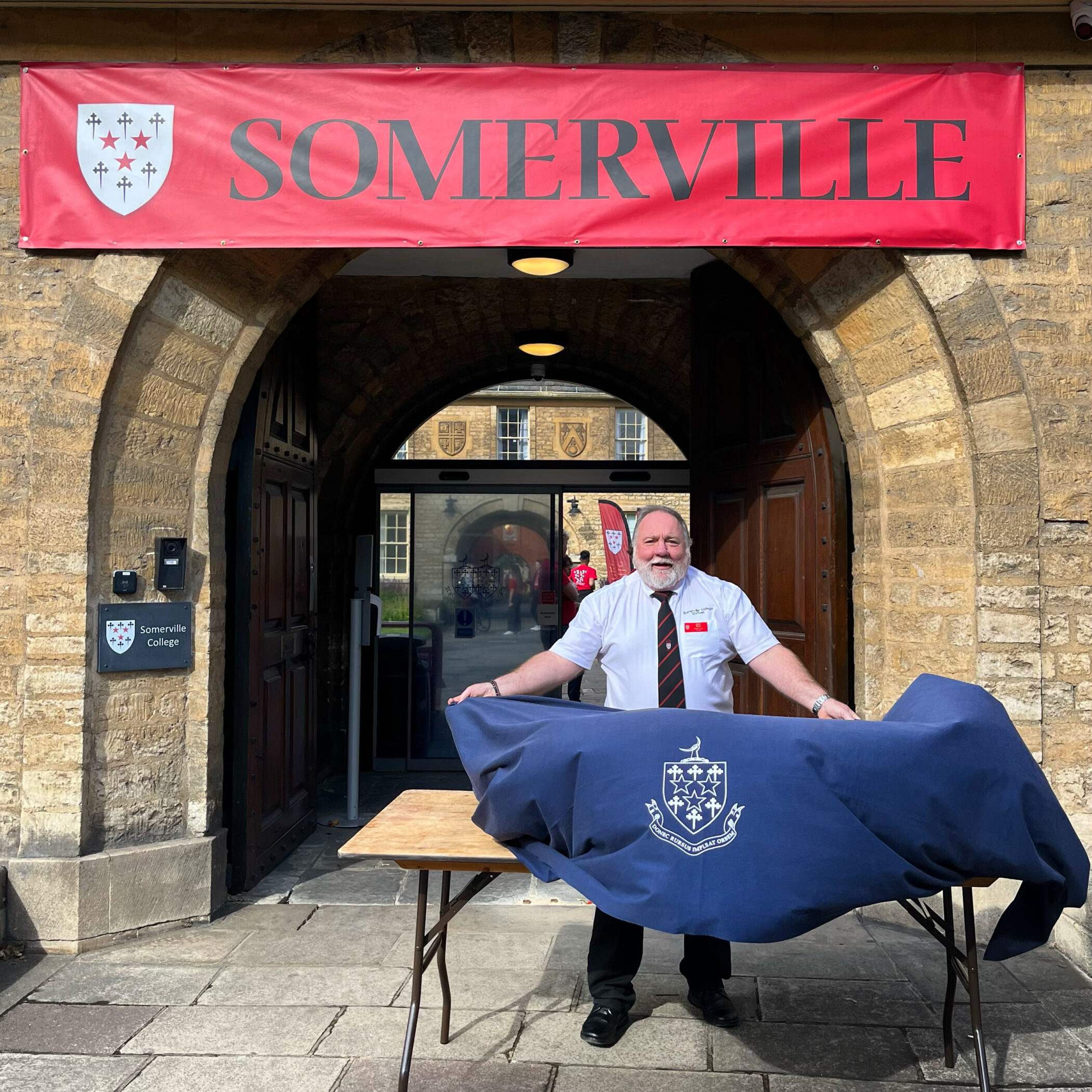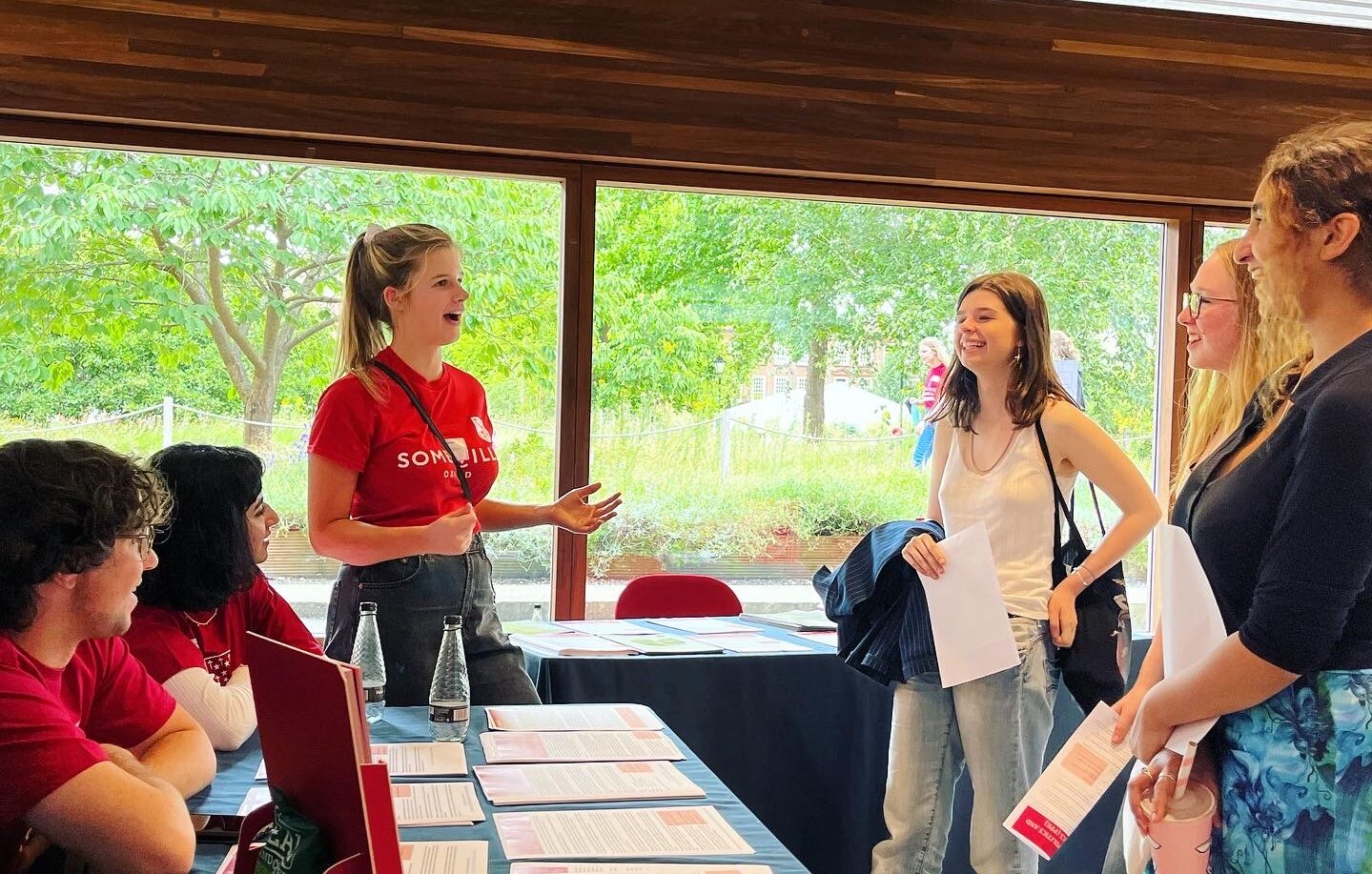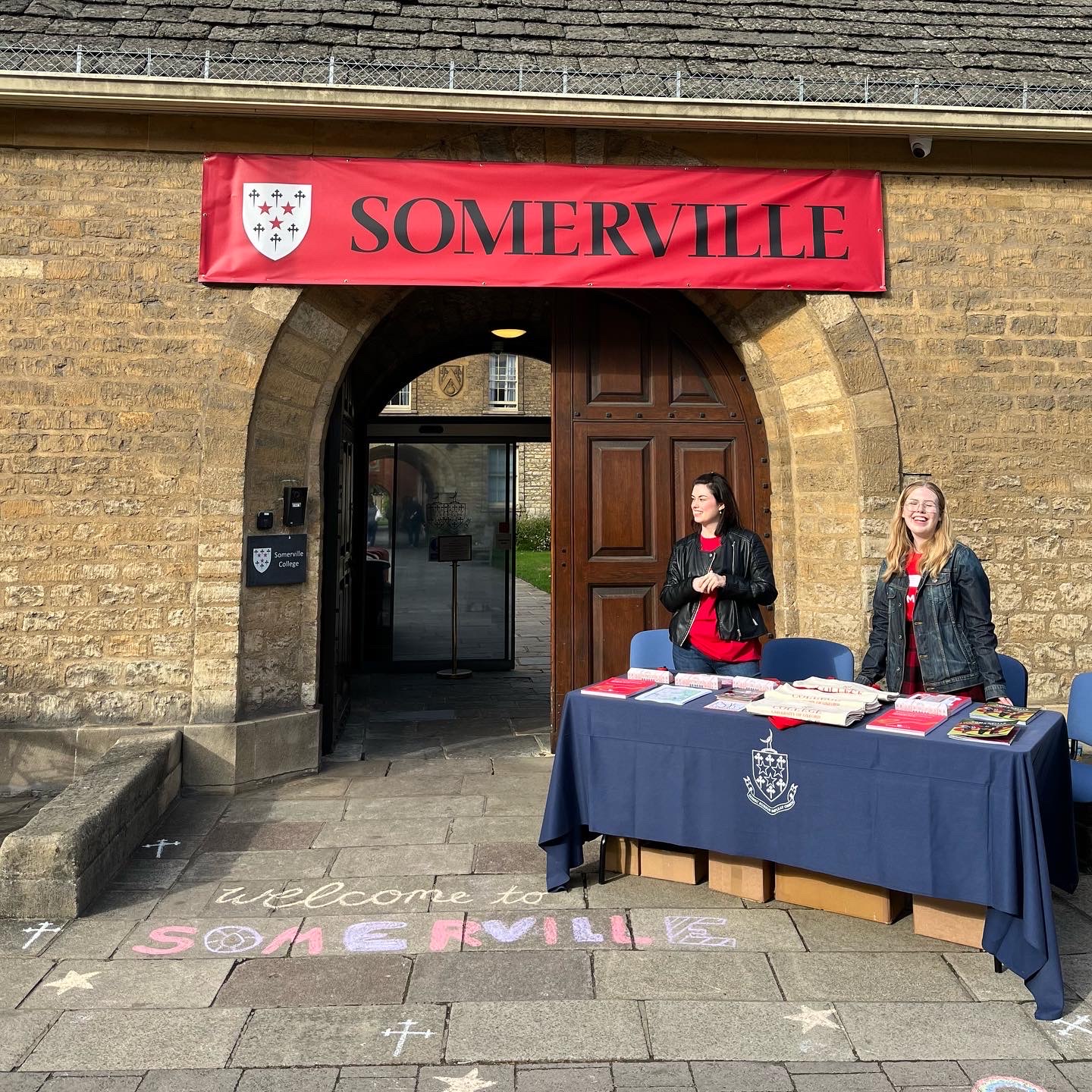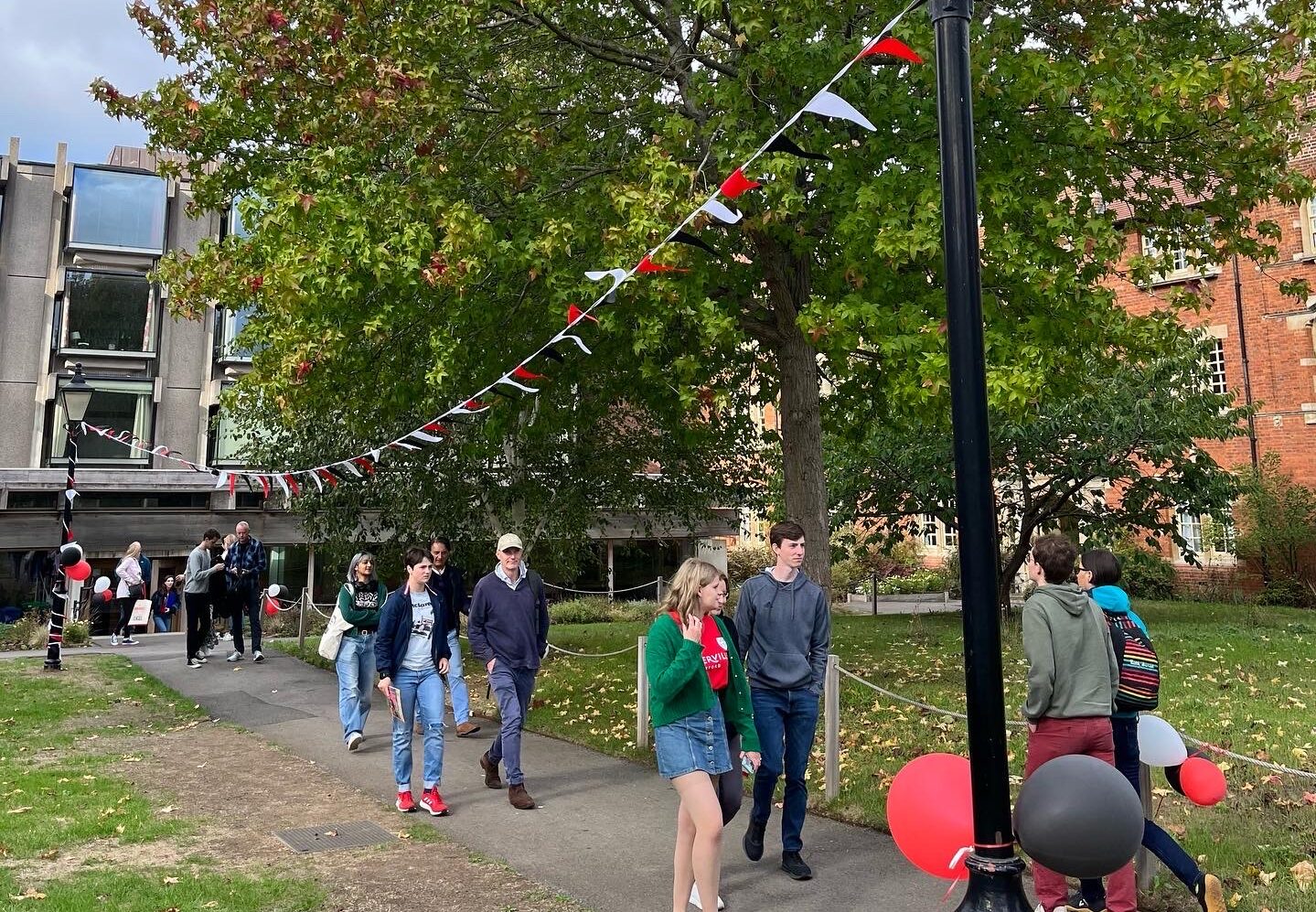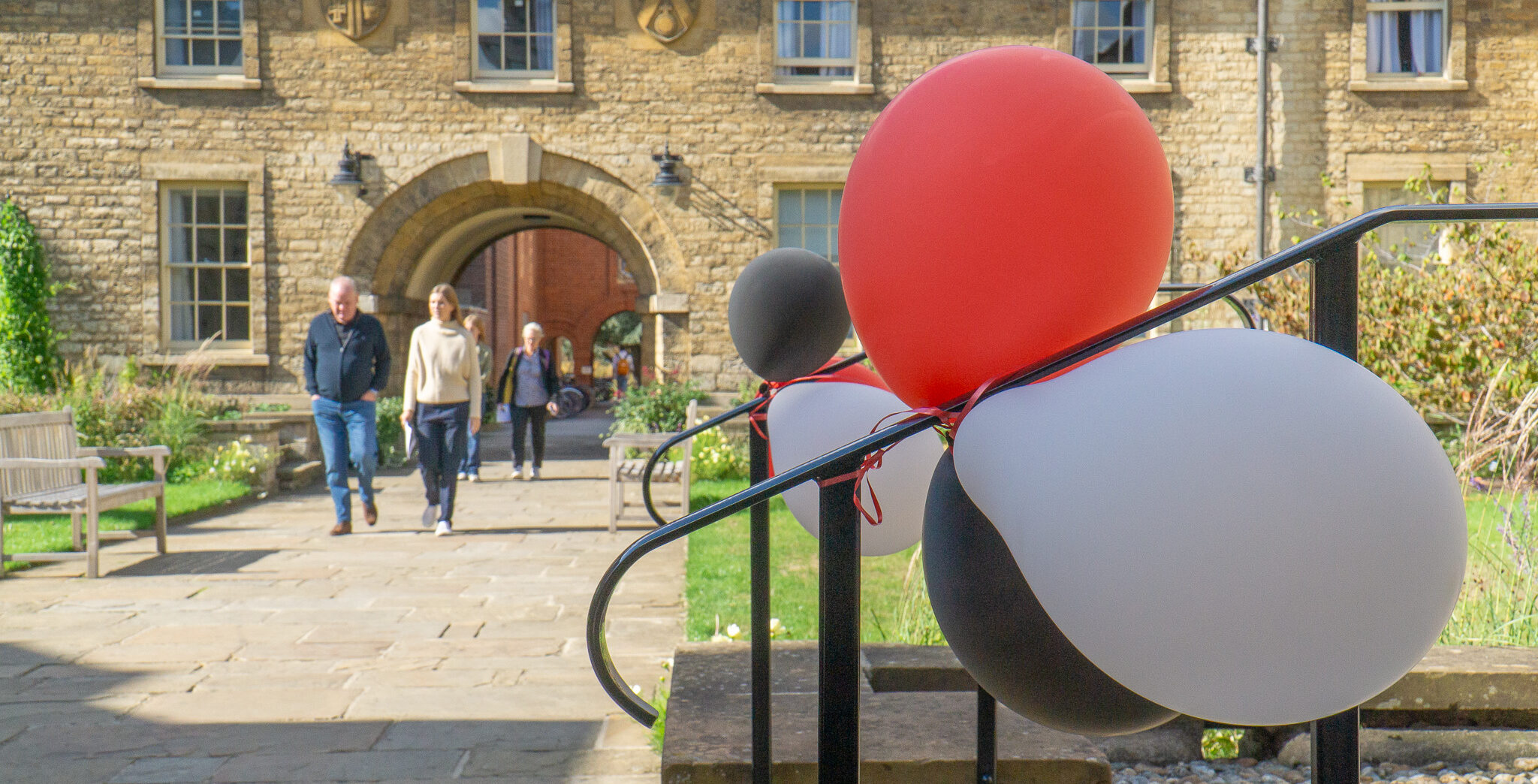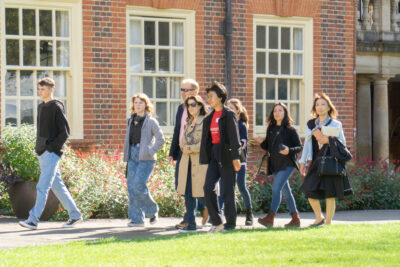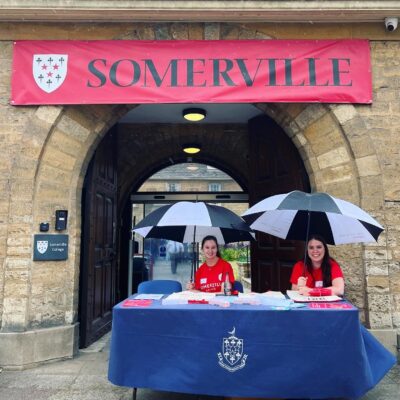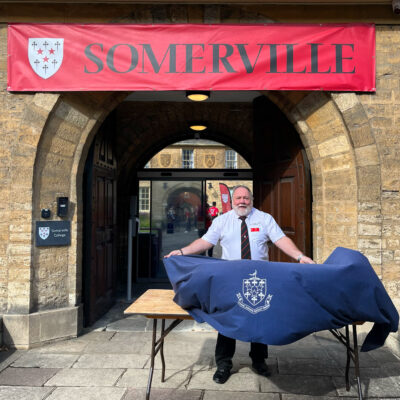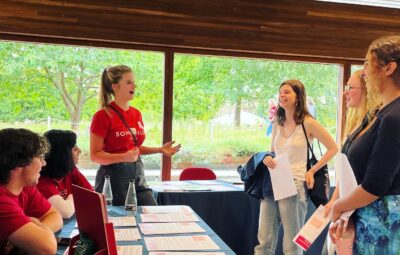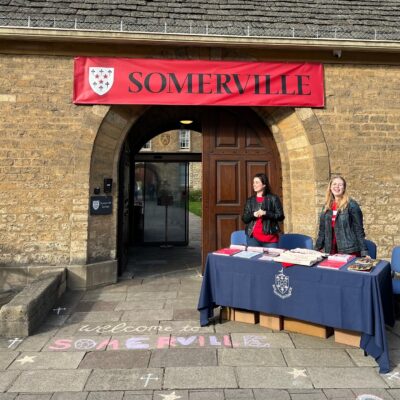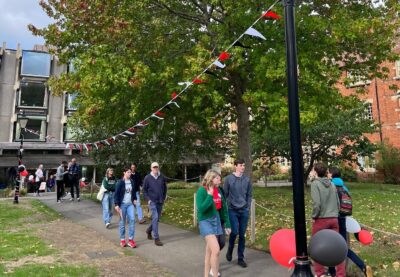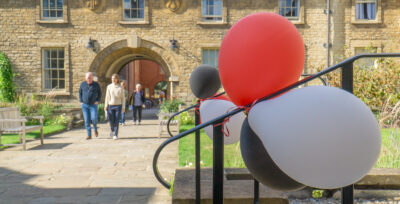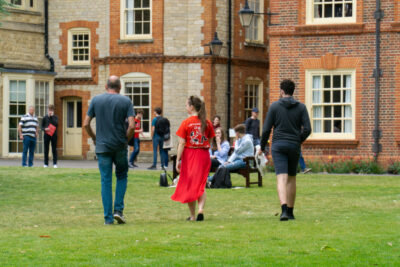Our doors are always open to schools and pupils interested in studying at Somerville.
Somerville is open to prospective applicants and offer holders; you can pick up a self-guided tour from the Porters’ Lodge when you arrive, or you can ask at the Lodge if there’s a member of the Academic Office or Access Office available to show you around. Members of the general public can visit us free of charge on most days, without needing to book ahead.
If you are a teacher, you can book a school visit for a group of students for next term using the following form, which includes options for schools to book both in-person and virtual visits:
Book a school visit (Virtual or In-Person)
We participate in the university-wide open days in June/July and September and host visits from schools each week during term time. We also host annual Year 12 Study Days and collaborate in university-wide Remote Interview Workshops in November for state school applicants from disadvantaged backgrounds to help demystify the interview process. See below for more information.
Open Days
The next University Open Days for prospective applicants will be on 26th-27th June and the 20th September.
At an Open Day, our team of warm and friendly student helpers will be on hand to guide you around the College and give you a first-hand account of life at Somerville. There’ll also be talks to help you learn more about the subject you’re interested in applying for.
Here is an indication of our usual timetable for Open Days:
College Opening Hours: 08:45-17:00
Free drop-in tours led by current Somerville students: 09:00-16:30
Admissions talk by Tutor for Admissions: 09.00-09.45 in Flora Anderson Hall. He will be available to chat to prospective applicants all day. Our Welfare Officer and Disabilities Lead, Jo Ockwell, will also be available to talk to on request.
Meet the tutors drop-in available from 12.30-14.00. An opportunity to meet one of the Somerville tutors in the subject of your choice!
The Director of Chapel Music may be available in the Chapel to discuss Choral Scholarships and the College Choir.
Refreshments:
There will be a free sandwich lunch from 12:30-14:00 in the Flora Anderson Hall. Tea & coffee will also be available throughout the day.
Accommodation
We do have some B&B rooms available in Somerville, which can be booked through our Bed & Breakfast page from August onwards. If you are UK-based, live over 70 miles away from Oxford and attend a state school we can provide you with a discount – please contact our Access & Outreach team if you are eligible.
If you wish to arrange a personal or school group visit to Somerville at another time, please contact our Access & Outreach team.
Oxford Remote Interview Workshops
Somerville is one of the colleges which participates in the University-wide Remote Interview Workshops, which are held in November following applications but before the invitations to interview are sent out.
These are run for Oxford applicants from disadvantaged backgrounds on Microsoft Teams, and involve general admissions guidance, as well as subject-specific workshops and Q&A opportunities with tutors and current students.
The subject workshops may include mock interviews, discussion of sample questions, and advice about what interviewing tutors are looking for.
More information will be sent out to eligible candidates nearer the time.
Year 12 Study Days
Somerville is host an annual series of Virtual Study Days. These are open to all Year 12 students currently at a UK state school or college. They are entirely free of charge.
The Study Days will feature taster lectures or workshops run by Oxford University academics, which will offer a challenging and entertaining introduction to university-level study of the subject.
The sessions are open to all Year 12 students at a UK State School who are taking a related subject, and/or are thinking about going on to study a related subject at university. There will also be opportunities to hear advice from admissions and outreach staff about applying to Oxford and Cambridge, and to ask the college tutors and current undergraduates questions about their subject of interest.
The 2024 Study Days will take place from the 12th to the 15th of February 15:00-17:30 each day. The daily timetable is as follows:
Timetable:
15:00-15:50: Admissions talk with Q&A
16:00-17:00: Academic taster session (2x subjects per day)
17:00-17:30: Subject Q&A with Academic and Student Ambassadors
Further details of the subject sessions which will be offered can be found below:
Monday 12th February
Law: Understanding Causation and Omissions in Criminal Law
This session will be an introduction to criminal law. It will explain the basics of causation and omission in criminal law. We will discuss why the rules of causation and omission work the way they do and reflect on whether these ruled need to be reformed.
This will be of interest to anyone thinking about studying Law or Criminology at university.
Dr Aradhana Cherupara Vadekkethil, Lord & Lady Early Career Fellow and Retaining Fee Lecturer in Law.
Biology: The Healing Power of Plants in the 21st Century
Mankind has exploited the medicinal properties of plants for thousands of years, yet the role of plants in modern medicine is still considered to be peripheral by many people. This tutorial attempts to put the record straight and to show that plant products are used every day by all of us to relieve pain and suffering, to heal wounds and cure diseases.
This will be of interest to anyone thinking about studying Biology or Medicine at University.
Dr Timothy Walker, Senior Stipendiary Lecturer in Plant Sciences; Former Director of the University of Oxford Botanic Garden and Harcourt Arboretum.
Tuesday 13th February
Engineering: Demystifying Cloud Computing
Cloud computing and cloud continuum, virtual machines and containers, IoT and Smart environments, GPUs and AI accelerators, carbon-aware computing and Net-Zero Internet: so many buzzwords, but few know what all of them mean.
This session will provide an introduction to cloud computing and its infrastructure. It will explain the basics of how cloud computing works and why it works this way, what are the building blocks, and where technology is likely to go next. The session will conclude with an introduction to sustainable computing and some of the challenges and opportunities in computing and sustainability interactions.
No prior knowledge is required. If you have a smart phone and use the Internet then this session is for you.
This session will be of particular interest to anyone thinking about studying Engineering at University.
Dr Noa Zilbermann, Fellow and Tutor in Engineering; Associate Professor of Engineering Science.
History: Mapping the Medieval Mediterranean
What can medieval maps tell us about the way that people in the past saw and understood their world? While modern cartographers are typically concerned with producing topographically accurate representations of space, medieval mapmakers used cartography to express a more abstract vision of the world informed by their religion, culture and mythology. Maps therefore provide historians with vital clues about the worldviews and perspectives of medieval people and societies, offering a window onto aspects of medieval life that are seldom represented in written sources. This session will explore a set of beautiful maps made in the medieval Mediterranean, at the intersection of the Christian and Islamic worlds. We’ll consider what these sources can tell us about the different cultures of the medieval Mediterranean, with a particular focus on relations between Christian and Muslim societies and the exchange of knowledge between them.
This session will be of interest to anyone thinking about studying History at University.
Dr Helen Flatley, Departmental Lecturer in History
Wednesday 14th February
English: ‘Tell me what I am!’ Some Old English Riddles and their Solutions
In this taster session, I will introduce you to some of the oldest writings in English. We will think about some of the differences – and similarities – between poetry written in the past and poetry written today, and we will investigate what these ancient texts can tell us about the people who wrote and read them.
This will be of interest to anyone thinking about studying English Literature at University.
Dr Annie Sutherland, Professor of Medieval Literature and Tutor in Old and Middle English.
Computer Science: There’s More to Programming Than Programs
The computer programs we write — even simple ones — don’t always work exactly as expected the first time we run them. So we debug them. Debugging code is an important part of software development, but it’s dangerous to rely on it as the only way of convincing ourselves (and perhaps our clients) that our programs work.
Robust, well-engineered software has already undergone a lot of testing and debugging at the design stage before anyone starts writing it up as runnable code.
In this session I’ll look at how we can use mathematics and logic in developing programs, to help us ensure that the code we end up with really does what we expect it to do.
This session is suitable for anyone currently studying Mathematics and/or Computer Science who is interested in studying Computer Science or a related subject at University.
Dr Quentin Miller, Lecturer in Computer Science.
Thursday 15th February
Maths: Mathematics of Order and Disorder
From zebra patterns to the bedroom or a teenager, the world around us is characterised by different levels of order and disorder. But how do you measure the level of order of a system. And how can explain how it evolves in time. In this presentation, we will talk about different approaches and views, starting from entropy – the second of thermodynamics – and the relative notion of information, to reaction-diffusion and pattern formation.
This session is suitable for anyone currently studying Mathematics, who is interested in studying Mathematics at University.
Dr Renaud Lambiotte, Fellow & Tutor in Mathematics; Professor of Networks and Nonlinear Systems.
Politics: The Politics and History of Decolonization
This session will examine the long, violent, uneven process through which numerous colonies in Asia and Africa achieved formal political independence from European empires. How did it come about? What were its causes and consequences? How was it shaped by the Cold War and vice versa? We will contextualise decolonisation and national liberation movements within the wider history of world politics, especially the world wars and the Cold War. And will trace different phases of decolonisation and compare three important cases, India, Ghana, and Egypt.
This session is suitable for anyone interested in studying Politics, PPE (Philosophy, Politics and Economics), International Relations or a related subject at University.
Dr Patricia Owen, Fellow & Tutor in International Relations; Professor of International Relations.
You can sign up for the study days here. The deadline for sign ups is 8th February at midday.
Young Carers' Insight into Higher Education Day
Somerville are delighted to be host an Insight into HE day for Young Carers’ in Year 12 at a UK state school.
This informal event is aimed that those who have caring responsibilities in their family and who are considering their post-18 education options. The afternoon will provide opportunities to learn more about university life, find out about the support available and also to meet current students, including those who are also young carers. The information talk will also be live streamed for those unable to come in person.
Example Timetable:
12:45-13:00 – Arrival and sign-in
13:00-14:00 – Information talk about University
14:00-14:30 – Tour of Somerville College
14:30-15:30 – Small group Q&As with current students
15:30-16:00 – Tea, coffee and biscuits
16:00 – Depart
If you have any questions please email access@some.ox.ac.uk
Year 12 BAME Day
A day aimed at Black, Afro-Caribbean and Asian Year 12 students from our Somerville link regions. The day is held in the Summer half term and provides an opportunity to find out more about life as a student at Oxford.
The day includes Q&As with current students and information and guidance about Oxford University including the admissions process.
Example Timetable:
10:15-10:45 – Arrival and sign-in
10:45-11:00 – Welcome
11:00-12:00 – Information and Guidance session
12:00-13:00 – Lunch
13:00-13:30 – Tour of Somerville College
13:30-15:00 – Oxford life talk and Q&A with current students
15:00-16:00 – Tea, coffee and biscuits
16:00 – Depart
Register for the event via this form
If you have any questions please email access@some.ox.ac.uk
Virtual Tour
Can’t wait until Open Days to have a look around? Luckily, thanks to our Interactive Map Tour, you won’t need to.
TAKE a Virtual Tour of Somerville
Or you can watch our students’ virtual tour video to see college through their eyes:
Watch our students’ Virtual Tour
Also check out our students’ bedroom tours to see some examples of our first year accommodation.
Join the Somerville Mailing List
School teachers may be interested in joining our mailing list in order to find out about the opportunities offered by Somerville and other parts of the University to learn more about studying at Somerville and Oxford.
Please email us at access@some.ox.ac.uk if you’d like to receive our regular newsletter or call 01865 270592 to find out more about applying to Somerville and organise a visit.
You can also find out about the latest outreach events by following us on Twitter.
